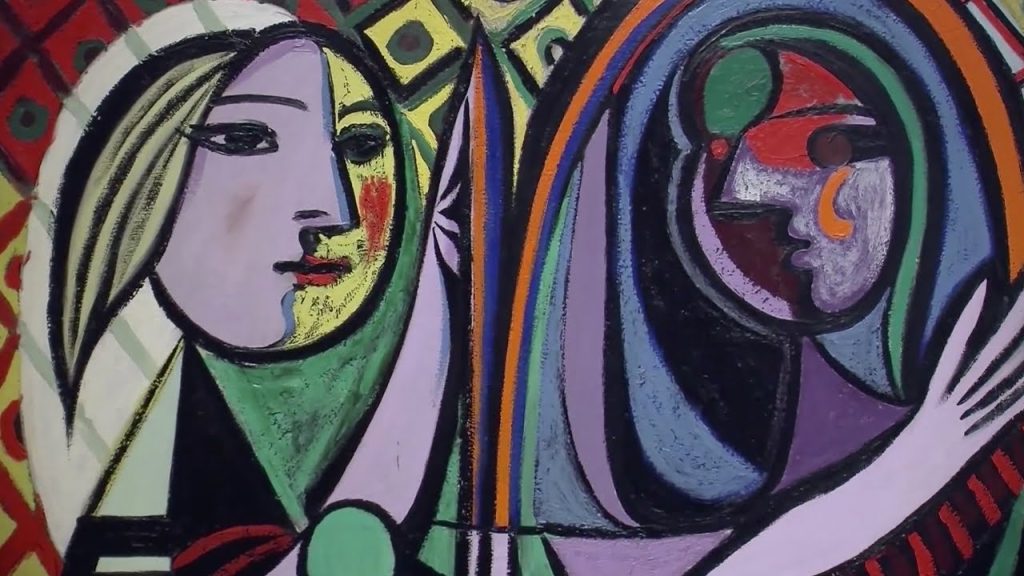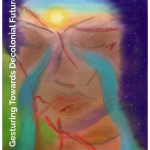Do We Have Any Idea What Deprogramming Ourselves Looks Like?
Via Gesturing Toward Decolonial Futures
Trying to bring people together to address local and global challenges, such as climate destabilization or systemic inequalities in times of increasing volatility, uncertainty, complexity and ambiguity is an enormous challenge in itself. Part of this challenge is that what has worked before in bringing people together is no longer working for many different reasons: reality is much more complex and more materially precarious for most; change is happening fast and differently from before, increasing dissonance between generations; there are more people involved and more diversity at the table, where many different ideas of “forward” compete for a platform (even between and within groups that have historically and systemically been marginalized) and stable authorities and enduring consensus are no longer possible. Another part of the challenge is that what is optimal for the process of learning and unlearning for one group of people can often be triggering and harmful to another and vice versa (with unevenly distributed harms and burdens).
This working list of invitations for “steps back” and “steps forward” was created to assist individuals and groups in the global north to address some of the contemporary challenges of bringing people together to respond to local and global challenges. The invitations were particularly informed by what we have learned navigating and negotiating the complexities, tensions and paradoxes of racial and colonial dynamics in group processes, as well as the complexities, tensions and paradoxes of negotiating conflicting diagnoses of problems and theories of change.
The invitations also attempt to interrupt a common dichotomy found in mainstream approaches to social change and problem-solving that pits a focus on solutions, action and hopefulness against a focus on complaints, inaction and hopelessness. We believe this dichotomous framing itself is part of the problem and reflects a severe limitation in mainstream problem-posing, problem-solving, accountability and coordination approaches.
The invitations also signal to the fact that we have been conditioned to create idealizations that make things more manageable, more positive, more hopeful, more comfortable and more actionable. These idealizations may address aspects of the challenge at hand, but since they are created to meet problematic conditioned emotional desires (for certainty, control, consensus, innocence, hope in secured futurity and validation), they disavow their own limitations, the harm they inflict and/or the human and nonhuman costs they generate.

Unless we can expand our capacity to hold space (cognitively, affectively and relationally) for all relevant aspects of reality, we have very little chance of approaching complex challenges or coordinating efforts in wiser (more mature), more sober, and more socially and ecologically accountable ways. This includes holding space for the good, the bad, the broken and the ugly within and around us, and the known, the unknown and the unknowable. We need to build stamina and “stomach” to navigate paradoxes, tensions, conflicts and contradictions, and to be comfortable with the discomfort of staying with the trouble and not turning away from what makes us uncomfortable, irritated, fearful and/or frustrated.
The 7 steps back and 7 steps forward exercise invites us to increase our capacity to hold the weight of multiple moving layers of complexity, complicity and uncertainty as we approach a contextual challenge. It also intends to support us to achieve deeper levels of insight, hindsight, foresight, analysis and discernment, to learn to build relationships differently and to develop stamina in order not to be immobilized and/or overwhelmed by discomfort, uncertainty, complexity, and/or complicity in systemic harm.
7 steps back
- Step back from your self-image: What are your real investments, fears, hopes and intentions and where do they come from? What emotions, insecurities, unexamined desires or unprocessed traumas could be driving your decision-making? What emotional states are you actively avoiding and at what cost? What does your ego feel entitled and justified to do? To what extent do these entitlements and justifications limit your capacity to face and address the challenges at hand?
- Step back from your generational cohort: How are the associated challenges perceived and experienced by other generations? How are different generations interpreting reality differently, experiencing it differently and expecting different things from it and how come? How fast are these changes happening? What is your generation being called out on? To what extent are the interests of incoming generations represented in your usual problem-posing, problem-solving, coordination and accountability approaches?
- Step back from the universalization of your social/cultural/economic parameters of normality: What does the privilege you carry prevent you from seeing and experiencing? How is your privilege also a loss? What are you projecting as true, real, normal and desirable for everyone and how does that reflect your own background? How can these projections become harmful to others and/or limit possibilities for relationship building and/or coordination? Who could refuse to work with you on legitimate grounds?
- Step back from your immediate context and time: How do the challenges in your immediate context reflect wider patterns of change in society across different timescales? What historical, systemic and/or structural forces are at work? What is your perspective of the larger picture? What are the boundaries of this perspective (how is it limited)?
- Step back from familiar patterns of relationship-building and problem-solving that you have been socialized into: To what extent has your approach to the problem been conditioned and limited by the culture it emerged from? What alternative ways of seeing, doing, relating and being are already viable, but are currently unimaginable to you and those around you? What are you missing out on? Who/what are you accountable to and how come? What accountabilities are you denying, rejecting and/or neglecting? What are you indifferent to and how come?
- Step back from the normalized pattern of elevating humanity above the rest of nature: To what extent and how is what is unfolding a consequence ofthe perceived separation between “man and nature” and/or the rendering of “nature” as property?How would you approach the problem differently if other species and entities (e.g. rivers, coral reefs, mountains) had legal personhood (if you could be liable for damages, negligence, injury and ecocide) and if they were accorded independent and inalienable rights to exist and to flourish (i.e. rights of nature)? To what extent are the interests of other species represented in your problem-posing, problem-solving, accountability and coordination approaches?
- Step back from the impulse to find quick fixes and expand your capacity not to be immobilized by uncertainty, complicity and complexity: In what ways is your approach to the problem part of the problem? To what extent are you being driven by desires for innocence, benevolence and hopefulness (e.g. a saviour complex) and how can these desires be harmful and/or detrimental to the task at hand? How can you leverage the recognition of complicity in systemic harm towards deeper and more enduring forms of responsibility and accountability? To what extent are you equipped to repair and weave relationships grounded on trust, respect, consent, reciprocity and accountability?
7 steps forward (and/or aside)
- Step forward with honesty and courage to see what you don’t want to see: commit to expanding your capacity to sit with what is real, difficult and painful: the good, the bad, the ugly and the brokenness of humanity within and around you. In what ways are your projections, idealizations, expectations, hopes, fears and fragilities preventing you from approaching the aspects of the problem that are unpleasant for you and/or that challenge your sense of reality and/or self-image? What aspects of the challenge at hand are you not willing or ready to see and how does this impair your ability to address the challenge itself?
- Step forward with humility to find strength in openness and vulnerability: commit to shedding your conditioned arrogance and sense of merit, status and self-importance in order to decenter yourself and centre the challenge you are trying to address. In what ways are you reproducing patterns that centre your desire for recognition, validation, prestige or protagonism (e.g. the saviour complex)? How can these desires limit your capacity to build relationships and to mobilize the coordination that is necessary for the challenge at hand?
- Step forward with self-reflexivity so that you can read yourself and learn to read the room: commit to tracing where your cognitive, affective and relational patterns of engaging with reality are coming from, where they are at, where they are going, their limitations and the ways they impact others and are part of the problem; learn to step back from yourself in order to read (the room) and to read how you (and what you are doing consciously and unconsciously) are being read in the room: learn to see yourself from other people’s perspectives, especially the unflattering parts, and learn to be ok with that (you won’t be able to control it anyway).
- Step forward with self-discipline to do the work on yourself so that you don’t become work for other people: commit to identifying and interrupting compulsions and impulses grounded on socially sanctioned and conditioned harmful patterns such as greed, vanity, arrogance, indifference, indulgence, extraction and consumption (of time, labour or energy of others). To what extent are you aware of your own compulsions and unhealthy reality-coping mechanisms? How do you justify the continuity of these patterns to yourself?
- Step forward with maturity to do what is needed rather than what you want to do: commit to the long-term project of becoming a good elder and ancestor for all relations. Taking into account that mainstream culture encourages and rewards self-infantilization and the denial of responsibility, how can you reorient yourself toward eldership and generational accountability? To what extent are you aware of the complexity of your own thoughts, emotions, investments and patterns of relationship building (the internal conversations that are happening within you)? What stories that you are telling yourself need to be further examined? What learning/unlearning have you been avoiding? Why and at what cost (for yourself and/or others)?
- Step forward with expanding discernment and attention: commit to expanding your capacity for discernment in proportion to the increase in complexity, this includes your capacity to read across time and across different layers of reality, and to hold paradoxes, tensions and uncertainties in view. What do you need to learn or unlearn cognitively, effectively and relationally in order not to be immobilized and/or overwhelmed by complexity, ambiguity, plurality and unknowability?
- Step forward with adaptability, flexibility, stamina and resilience for the long haul: move for the sake of learning to coordinate and be transformed by the process rather than arrive somewhere: be prepared to fall, to fail, to have your plans shattered, to be stretched, to have your heart broken (open, not apart), to change course and to find joy in the struggle itself rather than in the imagined prize at the end. To what extent are your desires and calculations to arrive at a predetermined destination preventing you from engaging in the experiments and experimentations whose failures will provide the “data” for new directions to take and better places we may aspire to go, that we cannot imagine from the outset?
Each of these steps (both steps back and steps forward) requires unlearning what we have been cognitively, affectively and relationally conditioned to think, feel, relate, hope and imagine in modern/colonial systems (including systems of formal education). This is very different from self-actualization because it is not about “mastery” of concepts or skills (filling a cup), but about “depth” (emptying that cup, shattering it and allowing the pieces to rebuild themselves into something you cannot imagine from the outset). The unlearning required for each step will likely be life-long and life-wide.
Licensed under a Creative Commons Attribution 4.0 International license.
This is a portion of the full article, available at Gesturing Toward Decolonial Futures






